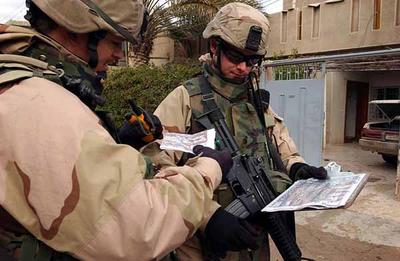
[[W A R]] * There’s an interesting piece over at the Democracy Arsenal site called “Death of a Salesman, 2005.” In it, Michael Signer argues that “Most of the problems about America’s situation in Iraq can be traced back not to faults in intelligence, to ... Bush’s failure at international diplomacy, or to internal disputes in Iraq. They’re instead rooted in an earlier, domestic catastrophe: the Bush Administration’s failure to convince the American people of the moral rightness of invading Iraq.” Signer goes on to opine that, because Bush & Company “sold the American people on this war in a hurried, political-blunderbuss, sort of way,” full of partisan calculations and disinformation (about weapons of mass destruction, Saddam’s nuclear capabilities, and how U.S. troops would be “greeted as liberators,” not as conquerors in Iraq), the public never had a chance to build up the sort of “moral passion” that will be necessary if the Iraq war is to be sustained over three, four, five, or more years.
As a result, when the tally of U.S. military deaths in Iraq climbs toward 2,000, the Iraqi National Assembly fails to come up with a constitution that can win agreement from Sunnis (thus increasing the odds of a civil war in that country), and the prez’s campaign to resell his Middle East battle plans in GOP-friendly states provokes less widespread praise than it does protests, the general public’s willingness to “stay the course” commences to crumble. This has led to falling job approval ratings for Bush and what Time magazine describes as “a certain sense of fatalism among Bush staffers, a belief that the difficult moments in Iraq just have to be toughed out ...” The prez’s warnings to expect additional violence in Iraq, as the former dictatorship’s constitutional process stumbles forward, and a growing chorus of questions from congressional Republicans about the Bush administration’s war planning, do nothing to assuage concerns.
Editor & Publisher reports that the obvious question is now being addressed to more and more politicians who’ve backed Bush’s Iraq policies: If you believe in this cause so deeply, why aren’t your own kids signing up? The prez’s spokespeople have previously had to field such queries, in regard to Bush’s twin, college-age daughters, Jenna and Barbara. But last week Mitt Romney, the first-term Republican governor of Massachusetts and a potential candidate for the presidency in 2008, was asked by the Boston Herald whether he has urged his five sons, age 24 to 35, to enlist in the Massachusetts National Guard--as he has suggested that other young men do. The Herald reported that Romney (who never served in the military himself) answered, with anger in his voice, “No, I have not urged my own children to enlist. I don’t know the status of my children’s potentially enlisting in the Guard and Reserve.” (According to Salon’s War Room, the Massachusetts National Guard takes volunteers up to 39 years old.) Also afoot is a slightly tongue-in-cheek movement--Operation Yellow Elephant--to “expose the hypocrisy of hawkish College Republicans and other young conservatives who are too cowardly to fight in the war they demanded.”
There’s no way of knowing whether all of this could have been avoided, had Bush, Dick Cheney, and Donald Rumsfeld been more patient and honest in selling the American public on their preventative war against Iraq. But as Michael Signer observes, the consequences of launching a war “on the cheap and on the sly” are proving disastrous. A cautionary tale for the future? We’ll see.
READ MORE: “President Needs to Come Out of Hiding,” by Joel Connelly (Seattle Post-Intelligencer); “The Ethics of Iraq: Moral Strength vs. Material Strength,” by Peter Daou (Salon); “Is Iraq Vietnam on Crack Cocaine?,” by Tom Engelhardt (Mother Jones); “The Last Throes: Resolve and Sacrifice” (1115.org).
ADDENDUM: Considering how unpopular the Bush administration’s Iraq adventure is becoming, is this really the right time to launch a stateside version of the military newspaper Stars and Stripes? Apparently, somebody thinks so. This domestic variation on S&S (which is funded by the Department of Defense) is being conceived as a weekly supplement to U.S. papers distributed in the proximity of military bases, and will draw content from its overseas editions. “We’re excited,” Dan Krause, international advertising director of Stars and Stripes, tells Editor & Publisher. “This is the first time we’ve been in the U.S since the Civil War.”
AND STILL MORE: Bruce Reed writes in Slate that “Every second-term president has his eye on the history books”--and with his new Gallup job disapproval rating of 59 percent, “Bush has secured his place in them. Of the 12 presidents who’ve served since Gallup started polling in the late 1930s, Bush has entered the ranks of the most unpopular. He’s now more unpopular than FDR, Ike, JFK, LBJ, Ford, and Clinton ever were, and has matched the highest disapproval rating of his idol, Ronald Reagan. ... At his current pace of losing favor, he could speed past two more presidents within the next month: Jimmy Carter, who peaked at 59 percent [disapproval] in mid-1979, and George H.W. Bush, who hit 60 percent in the summer of 1992. That would leave the current Bush just two more men to pass on his way to the top spot: Richard Nixon, who reached 66 percent before resigning in 1974, and Harry Truman, who set Gallup’s all-time [disapproval] record at 67 percent in January 1952.”







No comments:
Post a Comment